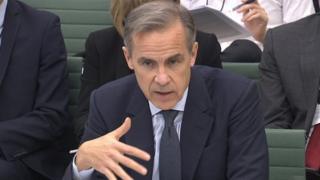Brexit: Food prices could rise 10%, says Bank governor

Food prices could rise between 5% and 10% if there is a disorderly Brexit, the Bank of England governor, Mark Carney, has warned.
Mr Carney told MPs that in the most “extreme” case, prices would rise by 10%, but in a less severe scenario the increase would be about 6%.
The Bank of England and its governor have attempted to assess the impact of Brexit on several occasions.
All its assessments have seen it as a potential negative for the economy.
Mr Carney’s colleague, Sir Jon Cunliffe, said the UK imported about half of its food from overseas.
The price rises would come partly from a fall in the value of the pound, partly from any tariffs imposed and partly from increased costs at the border as imports are checked.
Mr Carney told MPs on the Treasury Committee: “In the most extreme scenario, your shopping bill goes up 10%.”
Ports ‘not ready’
Mr Carney also said the UK’s ports were not ready for a no-deal Brexit that would see the country trade under World Trade Organization (WTO) rules.
He said: “At this point in time, the ports are not ready for a move to an administered WTO relationship.
“To be absolutely clear, our agents, my colleagues, we have gone to these ports and had conversations directly with the ports in question. We have talked to the private logistics companies, so we have gathered direct information on this.”
He and senior bank colleagues were challenged by MPs over what some critics have called scaremongering over Brexit.
Mr Carney said they had put a lot of work into the Bank’s assessments: “There’s no exam crisis. We didn’t stay up all night.”
He said a core team of 20 senior economists had worked on the assessments for a couple of years, 150 different professionals across the Bank were also drawn in and then the report was reviewed by both the Monetary Policy Committee and the Bank’s Financial Policy Committee.
‘Sleeping soundly’
The Bank has direct responsibility for the financial sector, which is losing jobs amid the Brexit uncertainty.
But Mr Carney said they were comfortable with preparations for their own sector, because they had braced themselves for the worst-case scenario: “We’re already sleeping soundly at night, because we have the financial sector, the core of the financial sector, in a position that it needs to be for a tough scenario.”
His colleague, deputy governor Sam Woods, who was also appearing before MPs, said fewer than 5,000 jobs had moved out of the country since the referendum out of some half a million employed in the sector, a “pretty small” number.


